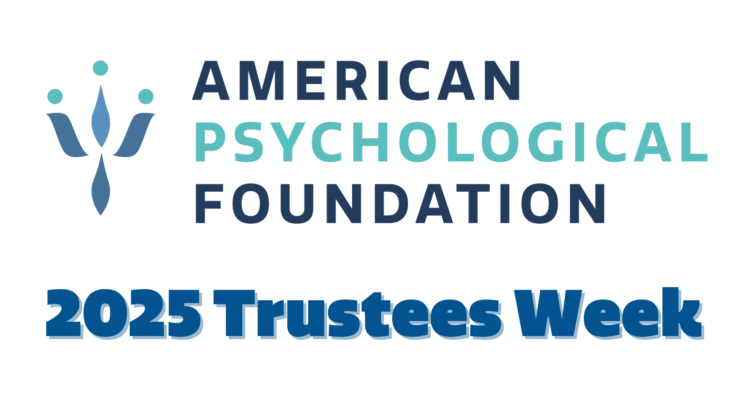APA 2024 EMPathy Symposium: Dr. Brian Kiluk


The goal of the Spielberger EMPathy (Emotion, Motivation, Personality) Symposium is to stimulate and facilitate the integration and dissemination of knowledge in these important areas of psychological inquiry. Each year, three presenters selected by APA Divisions 3 (Society for Experimental Psychology and Cognitive Science), 8 (Society for Personality and Social Psychology) 12 (Society of Clinical Psychology).
At APA 2024, we had the privilege of hearing from Dr. Brian Kiluk, the lecturer selected by Division 12. Dr. Kiluk delivered an insightful presentation, and provided this write-up to capture the key takeaways for those unable to join. Read on below to learn more about Dr. Kiluk’s work!
“Digital Delivery of Cognitive Behavioral Therapy for Substance Use Disorders”
Brian Kiluk, PhD
Yale School of Medicine
Cognitive behavioral therapy (CBT) is a type of psychotherapy that is based on the underlying idea that our thoughts, feelings, and behaviors are interrelated and impact our overall well-being. CBT takes a problem-oriented approach that focuses on helping individuals replace distressing thought patterns and change behavioral patterns that may be making problems worse. In terms of substance use disorders, CBT draws from social learning theory such that learning is considered an important factor in how individuals begin to use and maintain problematic patterns of substance use (Carroll, 1998). As such, learning also becomes an essential factor in helping individuals change their pattern of substance use, as the goal of CBT is to help people unlearn old, ineffective behaviors and learn new, more adaptive ones. The metaphor of learning to drive an automobile can be helpful to understand this process. Imagine you learned to drive an automobile in the United States, where the steering wheel is on the left side of the car, the instrumentation panel is positioned in a certain way, and the driving laws require you to drive on the right side of the road. You learned the complex aspects of driving an automobile over time in this environment, likely to the point where it has become an automatic pattern that requires minimal cognitive effort. Now imagine you found yourself in another country, England for example, where the cars and traffic laws are different. Now, the steering wheel is on the right side of the car, and you must drive on the left side of the road, requiring you to develop a whole new behavioral pattern. In order to adapt and function in this new environment, you would need to unlearn your old patterns and habits of driving by learning a new way. This is the essence of CBT for substance use disorders – unlearning maladaptive patterns of thoughts, feelings, and behaviors by learning new cognitive and behavioral strategies to improve functioning.
Although CBT is widely considered an effective and durable treatment for substance use disorders, there are challenges to implementation that has limited its access in the clinical community more broadly. CBT is a complex psychotherapy that requires clinicians receive training, monitoring, and ongoing coaching and supervision in order to ensure it is being delivered to patients consistently and at a high level of quality. Yet the cost of training, the high rate of clinician turnover in many community settings, and the inconsistent effort to confirm it is being adequately delivered, results in a version of CBT that might bear little resemblance to the one demonstrated to be effective in clinical trials (Carroll & Kiluk, 2017). To address potential variability in the quality of CBT provided in clinical practice, our research group at Yale led by the late Dr. Kathleen Carroll, created a computer-based version in the early 2000s called CBT4CBT (Computer-Based Training for Cognitive Behavioral Therapy). The emergence of computer-delivered and other digital systems (e.g., smartphone app) for delivering interventions offers numerous benefits for making evidence-based treatments more accessible. They can provide standardized and consistent quality, reduce costs and clinician time, and can be more readily available compared to traditional clinician-delivered treatments. However, the process of converting the delivery system of an evidence-based intervention from human-delivery to digital-delivery does not automatically convert the evidence base as well. In order for the benefits of digital delivery to be realized, it is essential to verify that the digitally-delivered intervention maintains the same key components and is as effective as the human-delivered intervention.
In developing CBT4CBT, the aim was to construct a highly engaging version of CBT that would convey the core cognitive and behavioral coping strategies via video, graphics, narrator-guided didactics, and interactive exercises. The CBT4CBT program consists of seven modules that cover the core skills described in the CBT manual published by the National Institute on Drug Abuse (Carroll, 1998). The central method by which CBT4CBT teaches these core coping strategies is through the learning process of modeling. In other words, people learn new skills by watching others and then trying it themselves. The CBT4CBT program uses professional actors demonstrating the use of skills in realistic situations that may be difficult for individuals to navigate when attempting to reduce or stop substance use. The use of characters and storylines provides an entertaining format to convey the skills and support behavior change in a way that is not possible for a clinician to teach within a group or individual therapy session. This engaging digital format offers the potential to enhance individuals’ learning of CBT skills as they view the skills ‘in action’ and complete interactive exercises to learn how to apply and practice the skills in their own environment. As is true for any digitally delivered intervention, the primary question is not how cool or novel the system is, but whether it is effective at addressing the target behavior, in this case substance use.
The answer to this question for CBT4CBT is a resounding yes. To date, there have been 9 published, randomized clinical trials evaluating the efficacy of CBT4CBT at reducing drug or alcohol use in various outpatient settings and populations (Carroll et al., 2008; Carroll et al., 2014; Carroll, Nich, DeVito, Shi, & Sofuoglu, 2017; Kiluk et al., 2024; Kiluk et al., 2016; Kiluk et al., 2018; Paris et al., 2018; Shi, Henry, Dwy, Orazietti, & Carroll, 2019; Tetrault et al., 2020). These trials have evaluated CBT4CBT either as an add-on to standard outpatient care or as a virtual stand-alone provided with brief weekly clinical monitoring, and the results support CBT4CBT as an effective intervention for reducing substance use. Furthermore, CBT4CBT appears to work through similar hypothesized mechanisms as traditional CBT. Specifically, we have found individuals receiving CBT4CBT show improvement in coping skills during a brief treatment period as well as continued improvement in the months following treatment (Kiluk et al., 2010), which is similar to processes found in traditional CBT. We’ve also found a greater increase in individuals’ knowledge of CBT concepts following access to CBT4CBT compared to other standard treatments, including human-delivered CBT (Kiluk et al., 2018). Interestingly, we’ve found that individuals rate their level of therapeutic alliance with the CBT4CBT program (referred to as the “digital alliance”) at a similar level as with a human clinician, and the stronger the alliance, the less alcohol use during treatment (Benitez, Frankforter, Nich, & Kiluk, 2023). Although there is more to understand regarding how the digital alliance is formed, we hypothesize that it may be due to the level of emotional engagement with the video-based vignettes of actors modeling the use of skills in realistic life situations. Thus, individuals appear to form a type of emotional bond with the CBT4CBT program, improve their knowledge and implementation of coping skills, and reduce their rates of substance use during and after a period of treatment.
In summary, the past 20 years have seen tremendous growth in the number and type of digital programs targeting mental health conditions. For CBT4CBT, what began as a relatively simple computer-based program to teach patients CBT skills for avoiding substance use with a high level of quality and consistency, and at a lower cost than standard methods for therapist training, has emerged as an evidence-based program that can improve patient outcomes when provided as a supplement to standard care or with brief clinical support. CBT4CBT, and other similar digital programs, can be incredibly useful at expanding access to evidence-based interventions for individuals who might not otherwise have access, while also providing a standard delivery system that can facilitate understanding of treatment mechanisms. But it is important for these digitally-delivered interventions to undergo the same level of research evaluation through randomized clinical trials as would be expected for any other behavioral intervention prior to broad dissemination. Ongoing work with CBT4CBT aims to identify the optimal strategies for implementation in routine clinical practice, the adaptation of content for various populations, and identification of patient characteristics that may impact its effectiveness. This research is all being conducted within the context of advancements in technology that progress at a far faster rate than the knowledge generated from research. The challenge moving forward is to maintain the level of careful scientific testing required to assure these interventions are safe and effective for the targeted population, while also keeping pace with the technological advancements so that the digital intervention being tested does not become obsolete by the time it is deemed evidence-based.
DISCLOSURE: Dr. Brian Kiluk is a consultant for CBT4CBT LLC, which makes versions of CBT4CBT available to qualified clinical providers on a commercial basis. Any conflict of interest is managed by Yale University.
Benitez, B., Frankforter, T. L., Nich, C., & Kiluk, B. D. (2023). The connection still matters: Therapeutic alliance with digital treatment for alcohol use disorder. Alcohol Clin Exp Res (Hoboken), 47(11), 2197-2207. doi:10.1111/acer.15199
Carroll, K. M. (1998). A Cognitive-Behavioral Approach: Treating Cocaine Addiction. Rockville, Maryland: NIDA.
Carroll, K. M., Ball, S. A., Martino, S., Nich, C., Babuscio, T., Gordon, M. A., . . . Rounsaville, B. J. (2008). Computer-assisted cognitive-behavioral therapy for addiction. A randomized clinical trial of ‘CBT4CBT’. American Journal of Psychiatry, 165(7), 881-888.
Carroll, K. M., & Kiluk, B. D. (2017). Cognitive behavioral interventions for alcohol and drug use disorders: Through the stage model and back again. Psychol Addict Behav, 31(8), 847-861. doi:10.1037/adb0000311
Carroll, K. M., Kiluk, B. D., Nich, C., Gordon, M. A., Portnoy, G. A., Marino, D. R., & Ball, S. A. (2014). Computer-assisted delivery of cognitive-behavioral therapy: efficacy and durability of CBT4CBT among cocaine-dependent individuals maintained on methadone. Am J Psychiatry, 171(4), 436-444. doi:10.1176/appi.ajp.2013.13070987
Carroll, K. M., Nich, C., DeVito, E. E., Shi, J. M., & Sofuoglu, M. (2017). Galantamine and Computerized Cognitive Behavioral Therapy for Cocaine Dependence: A Randomized Clinical Trial. J Clin Psychiatry, 79(1). doi:10.4088/JCP.17m11669
Kiluk, B. D., Benitez, B., DeVito, E. E., Frankforter, T. L., LaPaglia, D. M., O’Malley, S. S., & Nich, C. (2024). A Digital Cognitive Behavioral Therapy Program for Adults With Alcohol Use Disorder: A Randomized Clinical Trial. JAMA Network Open, 7(9), e2435205-e2435205. doi:10.1001/jamanetworkopen.2024.35205
Kiluk, B. D., Devore, K. A., Buck, M. B., Nich, C., Frankforter, T. L., LaPaglia, D. M., . . . Carroll, K. M. (2016). Randomized Trial of Computerized Cognitive Behavioral Therapy for Alcohol Use Disorders: Efficacy as a Virtual Stand-Alone and Treatment Add-On Compared with Standard Outpatient Treatment. Alcohol Clin Exp Res, 40(9), 1991-2000. doi:10.1111/acer.13162
Kiluk, B. D., Nich, C., Babuscio, T., & Carroll, K. M. (2010). Quality versus quantity: acquisition of coping skills following computerized cognitive-behavioral therapy for substance use disorders. Addiction, 105(12), 2120-2127. doi:10.1111/j.1360-0443.2010.03076.x
Kiluk, B. D., Nich, C., Buck, M. B., Devore, K. A., Frankforter, T. L., LaPaglia, D. M., . . . Carroll, K. M. (2018). Randomized Clinical Trial of Computerized and Clinician-Delivered CBT in Comparison With Standard Outpatient Treatment for Substance Use Disorders: Primary Within-Treatment and Follow-Up Outcomes. Am J Psychiatry, 175(9), 853-863. doi:10.1176/appi.ajp.2018.17090978
Paris, M., Silva, M., Añez-Nava, L., Jaramillo, Y., Kiluk, B. D., Gordon, M. A., . . . Carroll, K. M. (2018). Culturally Adapted, Web-Based Cognitive Behavioral Therapy for Spanish-Speaking Individuals With Substance Use Disorders: A Randomized Clinical Trial. Am J Public Health, 108(11), 1535-1542. doi:10.2105/ajph.2018.304571
Shi, J. M., Henry, S. P., Dwy, S. L., Orazietti, S. A., & Carroll, K. M. (2019). Randomized pilot trial of Web-based cognitive-behavioral therapy adapted for use in office-based buprenorphine maintenance. Subst Abus, 40(2), 132-135. doi:10.1080/08897077.2019.1569192
Tetrault, J. M., Holt, S. R., Cavallo, D. A., O’Connor, P. G., Gordon, M. A., Corvino, J. K., . . . Carroll, K. M. (2020). Computerized Cognitive Behavioral Therapy for Substance Use Disorders in a Specialized Primary Care Practice: A Randomized Feasibility Trial to Address the RT Component of SBIRT. Journal of Addiction Medicine, 14(6), e303-e309. doi:10.1097/adm.0000000000000663
Want to contribute to projects like this and create impact with psychology? Donate to APF today!
Topics: Convention
Discover More

Psychology & Philanthropy In Action with Dr. Kiara Álvarez
At APF, we’re bringing together the shared power of psychology and philanthropy to create a world where people are healthy, happy, and living with dignity. …

Why Psychology & Philanthropy Make the World Better
In this blog post, APF’s CEO, Dr. Michelle Quist Ryder, and APF’s Managing Director & Head of Philanthropy, share their insights on how philanthropy and …

Trustees Week: Celebrating APF’s Board of Trustees
We’re celebrating Trustees Week! At APF, we’re proud to work alongside our amazing Board of Trustees, who volunteer their time, talent, and expertise to help our mission thrive.
